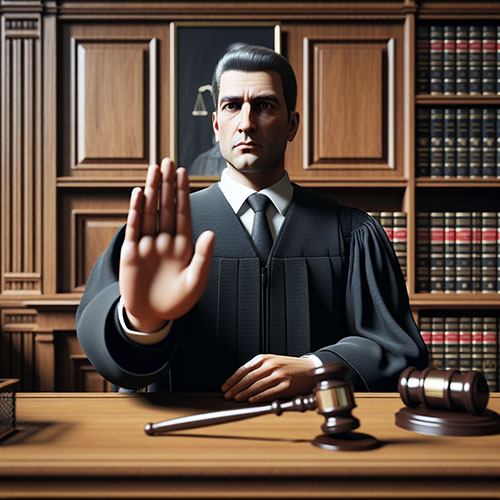Squats are becoming a major problem for property investors in the rental market, or simply for primary and especially secondary residences.
Complaints and testimonies are flooding the web, YouTube, newspapers, and TV shows.
Squats often lead to absurd situations, representing a real ordeal for the victims of this growing scourge.
In addition to the endless administrative procedures, there are the costs of bailiffs and lawyers, expenses related to property damage, constant anxiety to resolve the problem, risks related to the owner's liability, potential issues with the justice system...
It is imperative to protect your home preventively with an active protection solution before this situation occurs.

What are the main challenges that property owners face regarding squats?
Property owners face several significant challenges concerning squats in France:
Eviction difficulties
Despite recent strengthening of legislation, evicting squatters often remains a long and complex process:
- The accelerated administrative procedure, meant to allow eviction within 72 hours, is not always effectively applied
- Some prefects are reluctant to implement this rapid procedure
- Classic legal procedures can take several months, or even years
Damages and financial losses
The illegal occupation of a property often leads to:
- Significant material damage requiring costly repairs
- Loss of use of the property for the entire duration of the occupation
- Possible devaluation of the property due to its tarnished reputation
Legal risks for owners
Paradoxically, owners expose themselves to sanctions if they try to reclaim their property by themselves:
- An owner who evicts squatters themselves risks 3 years in prison and a €30,000 fine
- Cutting off water or electricity to a squatted property is also illegal and punishable
Lack of information and support
Owners often find themselves helpless in this situation:
- Some police officers and gendarmes are unfamiliar with the new anti-squat procedures
- The lack of official data on the extent of the phenomenon complicates its management
Debates on rehousing squatters
Eviction can be delayed for social reasons:
- Some prefects refuse or delay eviction as long as squatters don't have a rehousing solution
- This situation can considerably prolong the illegal occupation of the property

What are the financial consequences for an owner facing a squat?
The financial consequences for an owner confronted with a squat can be significant and multiple.
The financial consequences of a squat can be considerable for an owner, going well beyond the simple loss of rent. The cumulative costs (repairs, procedures, devaluation) can represent a significant portion of the property's value itself.
Direct financial losses
- Loss of rent: The owner cannot collect rent for the entire duration of the illegal occupation
- Material damages: Squatters often cause significant damage to the property, requiring costly repairs
- Unpaid bills: The owner may end up having to pay water and electricity bills consumed by the squatters
Procedural costs
- Legal fees: Resorting to a lawyer for the eviction procedure incurs high fees
- Bailiff fees: To document the illegal occupation and serve procedural documents
- Locksmith fees: To secure the property after eviction
Property devaluation
- Loss of value: The reputation of a squatted property can decrease its value on the real estate market
- Difficulty selling or renting: The property becomes less attractive to potential buyers or tenants
Other potential costs
- Rehousing compensation: In some cases, the owner may be forced to contribute to the rehousing of squatters
- Loss of exploitation: If the property was intended for rental, the owner loses rental income for the entire duration of the occupation and restoration
- Security costs: To prevent new occupation after eviction

What are the average timeframes to evict a squatter
The timeframes to evict a squatter can vary considerably depending on the cases, regions, and conditions of the squat.
Simplified "anti-squat" procedure (Article 38 of the DALO law):
- Timeframe of about 72 hours from the request to the prefect
- The prefect has 48 hours to serve notice to the squatters to leave the premises
- The squatters then have at least 24 hours to leave the property
Classic judicial procedure:
- Several weeks to several years depending on the courts
- On average, 4 months to obtain an eviction decision in summary proceedings (in 2018)
- After the judge's decision, a 2-month period is granted after the order to leave the premises
Case of flagrante delicto (occupation of less than 48 hours)
Immediate police intervention possible after filing a complaint, but it must be proven that the occupation is less than 48 hours...

What are the legal procedures to follow in case of a squat in France?
According to the information provided, there are two main legal procedures to evict squatters in France:
The simplified (or accelerated) administrative procedure:
- Applicable for primary and secondary residences since the Kasbarian law of 2023. Total timeframe of about 72 hours.
- Confirmation of illegal occupation by a judicial police officer, mayor, or justice commissioner.
- Owner's request to the prefect to serve notice to the squatters.
- Prefect's decision within 48 hours.
- Minimum 24-hour period for squatters to leave the premises.
The classic judicial procedure:
- Necessary if the simplified procedure is not applicable. Longer and more costly.
- Prove property ownership and illegal occupation.
- Petition the judge for protection and litigation in summary proceedings.
- Notification of the eviction order.
- One-month period to leave the premises.
- Possibility of resorting to public force 2 months after the order to leave the premises.
In both cases, it is strongly recommended to:
- File a complaint for home invasion.
- Have the occupation documented by a justice commissioner.
- Seek assistance from a specialized lawyer.
It is important to note that the owner must under no circumstances attempt to evict the squatters themselves, under penalty of criminal sanctions.

What documents are necessary to prove property ownership?
To prove property ownership, the main necessary documents are:
- The property title.
This is the official document that certifies you are the legitimate owner of the property.
It is established by the notary during the acquisition of the property.
It contains detailed information about the property, its history, and successive owners. - The real estate ownership certificate.
This is a provisional document issued by the notary pending the final property title.
It certifies that you are the owner of the property following a purchase, donation, or inheritance.
It allows for most routine administrative procedures. - The notarized deed of sale.
This is the document signed during the acquisition of the property, which serves as the property title. - The latest property tax notice.
This document can also serve as proof of ownership. - For properties in co-ownership, the co-ownership regulations and the descriptive statement of division may be requested.
- In case of construction: The building permit and the declaration of completion of works can complete the file.
- In case of inheritance: The certificate of ownership after death, established by the notary.
These documents allow you to prove your status as owner for various administrative procedures, such as subscribing to utilities (water, electricity, etc.), applying for home insurance, or selling or renting the property.

What are the consequences if one intervenes themselves to evict squatters?
Intervening oneself to evict squatters is illegal and can have serious consequences:
Criminal sanctions:
- The owner risks up to 3 years imprisonment and a €30,000 fine
- These sanctions are provided for by Article 226-4-2 of the Penal Code
Accusation of home invasion
- Squatters can file a complaint against the owner for home invasion
- Even if the complaint is dismissed, it can lead to the opening of a legal procedure
Additional sanctions in case of violence
If the owner uses violence, they can be sentenced to heavier penalties depending on the severity of the injuries inflicted
Legal risk
The owner exposes themselves to legal proceedings, which can lead to additional costs and complications
Ineffectiveness of the action
Illegal eviction can be contested, which could allow squatters to remain on the premises
It is therefore strongly advised against evicting squatters oneself. The law requires that eviction be carried out by competent authorities, either by court decision or by prefectural intervention under the accelerated administrative procedure

How to protect oneself in case of law enforcement refusal for an eviction?
In case of law enforcement refusal to proceed with an eviction, here are the main steps you can take to protect yourself:
Request a written and reasoned decision for the refusal
Demand from the prefect a written decision explaining the reasons for the refusal of law enforcement assistance.
File a gracious appeal
- Address a gracious appeal to the prefect by registered letter with acknowledgment of receipt.
- Explain your situation and request a review of your case.
Initiate a compensatory appeal
- If the refusal persists, you can request compensation from the State.
- The prefect has 4 months to respond to this compensation request.
Refer to the administrative court
- In case of refusal of compensation or lack of response, you have 2 months to refer to the administrative court.
- A lawyer is mandatory for this procedure.
Emergency procedure
- In case of urgency, you can initiate a référé-liberté procedure before the administrative judge.
- The judge must rule within 48 hours.
Document your prejudice
- Keep all evidence of your prejudice (unpaid rent, damages, etc.).
- These elements will be useful to quantify your compensation claim.
Maintain pressure
Continue to regularly solicit the prefect for the execution of the court decision.
Consider mediation
In some cases, mediation with the occupants can be attempted to find an amicable solution.
It is important to note that the State is obliged to lend its assistance in the execution of court decisions, and its refusal gives right to compensation according to Article L.153-1 of the Code of Civil Enforcement Procedures. A specialized lawyer can effectively guide you through these complex procedures.

How can I obtain an emergency court order for a quick eviction?
To obtain an emergency court order for a quick eviction of squatters, here are the main steps to follow:
Hire a lawyer
It is strongly recommended to hire a lawyer specializing in real estate law to assist you in this procedure.
Gather evidence
- Property title
- Proof of illegal occupation (bailiff's report, testimonies, photos, etc.)
- If possible, identity of at least one of the squatters
File a petition with the judge of protection disputes in summary proceedings
- Your lawyer will file an emergency petition with the judicial court responsible for the squatted property.
- The summary procedure allows for a quick decision from the judge.
Summon the squatters
A bailiff will have to deliver a summons to the squatters for the hearing.
Hearing
- During the hearing, your lawyer will argue for the quick eviction of the squatters.
- The judge will make a decision, usually within a short timeframe.
Notification of the court order
The emergency court order must be served to the squatters by a bailiff.
Execution deadline:
- Squatters normally have one month to leave the premises after notification.
- However, the judge can remove this delay in the case of squatters who entered by force.
Order to vacate the premises
If the squatters do not leave, a bailiff can issue an order to vacate the premises.
Use of law enforcement
As a last resort, the bailiff can request the assistance of law enforcement from the prefect to proceed with the eviction.
It is important to note that the summary procedure generally allows for a quicker decision than a standard procedure, but the exact timeframes may vary depending on the courts and the complexity of the case.

How to protect against squatting?
Here are the main measures to protect against squatting:
Simulate presence in the property
- Use timers to turn lights on/off
- Ask a neighbor to collect mail and open/close shutters
- Use smart plugs to control certain devices remotely
Secure access points
- Install reinforced doors and locks
- Install window bars
- Set up a gate and tall hedges
Install a security system
- Connected alarm with motion detectors
- Video surveillance cameras
- Visible warning signs
- Anti-squatting panels on openings (doors, windows)
- Reinforced anti-squatting doors
Regularly monitor the property
- Frequent visits if possible
- Ask a neighbor to check regularly
- Sign up for the "Operation Tranquillité Vacances" (Vacation Peace of Mind) program
- Coordinate surveillance with the neighborhood
- Take out suitable home insurance
Protect effectively with active protection
The most radical (and legal) solution is to set up active protection devices:
- A fog generator
- An anti-intrusion sound bar
- A disorienting light device
With such protection systems, your premises or home will be inviolable.
Simple methods, with small budgets compared to the disaster that squatting can cause.
